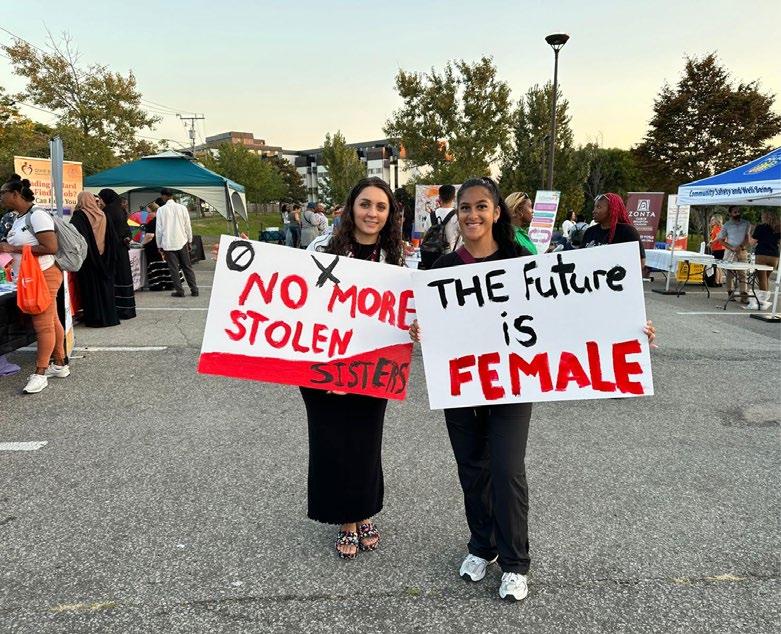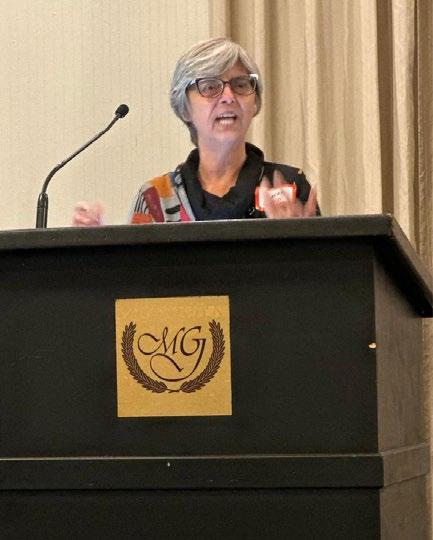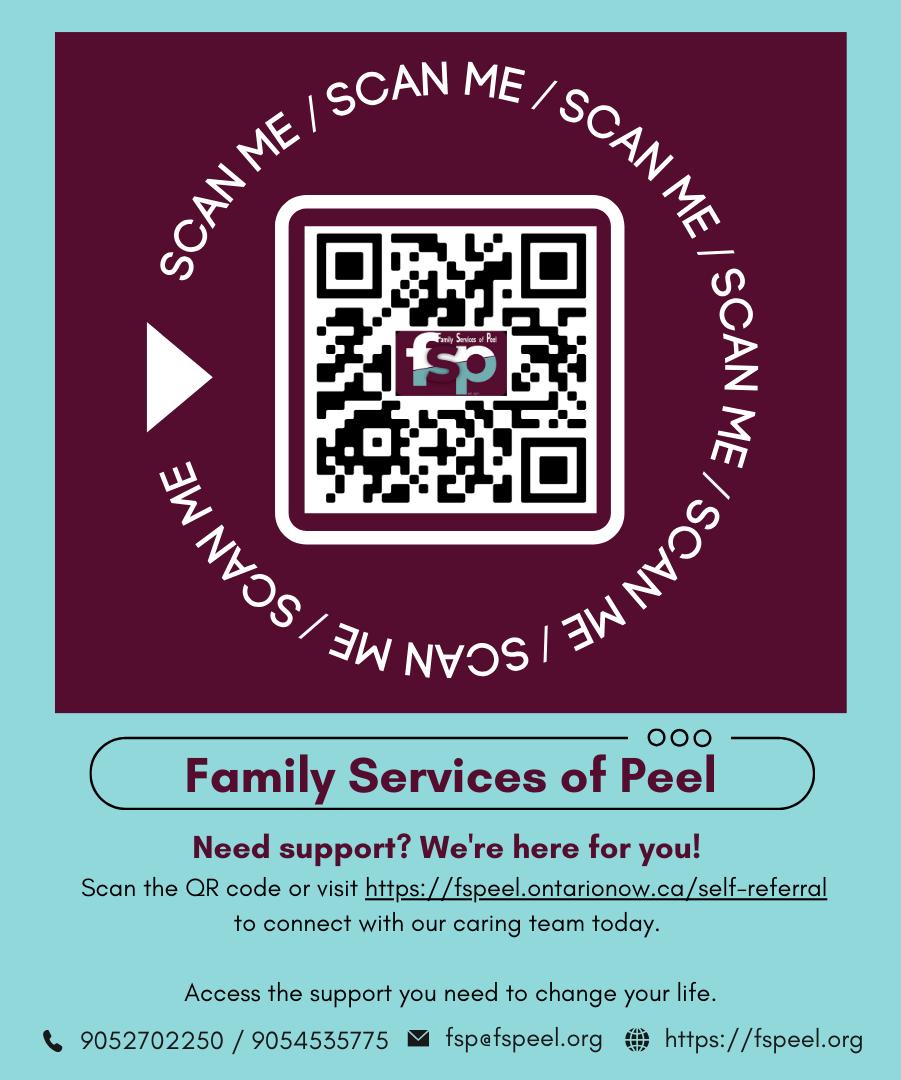
Volume 16; Issue 4; December 2024





Volume 16; Issue 4; December 2024






As we reflect on 2024, I am filled with immense pride and gratitude for the successes we've achieved together at Family Services of Peel. This past year has been a remarkable one, marked by meaningful growth, impactful programs, and unwavering dedication to our mission of enhancing lives and strengthening families in our community.
Our commitment to serving the diverse needs of Peel remains at the forefront of our work, and I'm pleased to share that we’ve reached significant milestones in doing so. From providing accessible, responsive services to hosting multiple conferences and community events, each initiative has furthered our ability to connect with clients, offer support, and build stronger, healthier families. Every department has contributed to these successes, and I commend our teams for their resilience, compassion, and focus.
Looking forward, we are excited to embark on our new strategic planning process, which will guide us into the future. This plan will be rooted in the same commitment to supporting families and individuals in Peel while also reflecting innovative approaches and partnerships that will amplify our impact. We’re kicking off this journey with a collaborative community event in February, where we’ll be engaging with clients, community partners, and stakeholders to gather insights, strengthen connections, and shape our shared vision for the future.
None of these accomplishments would be possible without the support and dedication of our incredible staff, Board of Directors, funders, and community partners. Your commitment drives our work, and your passion ensures that we continue to grow and evolve in meaningful ways. Together, we are building a brighter future for Peel, and I am incredibly optimistic about the path ahead.
Thank you for being part of this journey. Here’s to continued growth, collaboration, and transformation in the years to come.
Warm regards,

Sandra Rupnarain
Executive Director, Family Services of Peel

Family Services of Peel (FSP) actively participates in community events to foster connections, support local initiatives, and promote the agency’s mission of empowering individuals and families. FSP has attended several impactful gatherings, showcasing their dedication to building a stronger, more inclusive community.
One notable event was Take Back the Night, where FSP staff stood in solidarity with survivors of genderbased violence. This global movement provided a platform to raise awareness, amplify survivors' voices, and advocate for safety and equality. Our staff joined the march and engaged with attendees, reinforcing FSP’s commitment to ending violence in all its forms.


FSP also participated in the Catholic Family Services Peel-Dufferin (CFSPD) Open House, an opportunity to strengthen partnerships with other service providers and the community. FSP Mangaers engaged with visitors, offering insights into FSP’s diverse programs while fostering collaborative efforts to better serve clients in Peel.
These events underscore FSP’s dedication to advocacy, collaboration, and community-building, ensuring that every individual has access to the support they need.
Another highlight was the Regeneration Community BBQ, which brought together diverse members of the community to enjoy a day of fun, food, and fellowship. FSP staff connected with attendees, sharing information about available programs and services, while celebrating the spirit of unity that makes Peel Region unique.

The Community of Learning (COL), an annual event by Family Service Canada, was hosted this year by Family Services of Peel at Novotel Toronto Centre. This dynamic gathering brought together the leaders of Family Services all over the country to explore groundbreaking approaches in leadership, community engagement, and knowledge sharing.
The event commenced with an acknowledgment of Indigenous lands, reflecting a commitment to truth and reconciliation. Paul Born, a celebrated community change facilitator, delivered a keynote on Complexity Leadership. His insights emphasized moving beyond hierarchical models to foster adaptability and collective action. Interactive workshops delved into managing complex problems, highlighting the significance of shared responsibility and emergent strategies. Born’s “Breakthrough Community Change” session inspired attendees to develop common agendas capable of driving transformative outcomes.


The second day explored actionable frameworks for complexity leadership. Participants engaged in discussions on fostering collaboration and adaptive decision-making in their organizations. Born introduced concepts from his Deepening Community framework, focusing on building joy, trust, and mutual support amid challenges. Sessions on asset-based community development and the role of storytelling emphasized the value of personal connections in driving systemic change
The conference also showcased innovative programs through presentations and poster sessions. Attendees learned from case studies that demonstrated effective, scalable solutions to community challenges. Networking breaks provided space for dialogue, encouraging cross-sector collaboration and the sharing of diverse perspectives.
With thought-provoking workshops, practical strategies, and opportunities to build meaningful connections, the Community of Learning event underscored the importance of adaptive leadership and collective action in navigating today’s complexities.


The annual United Way Fundraising Campaign has successfully achieved its goal of raising $5,000! This milestone reflects the collective generosity, teamwork, and commitment of everyone involved. This year’s campaign featured a variety of engaging activities, including pledge drives, scrumptious potlucks, and an exciting online auction.
The campaign’s success was marked by exciting activities and well-deserved prizes. The Developmental Services (DS) team led the way, raising the highest funds collectively through potluck contributions, activities, and pledge forms. Members of the Senior Leadership Team Sandra, Brenda, Jack, and Monica provided significant contributions via pledge forms and auction participation.
A special thank-you goes to the Events Committee (Rasha, Angel, Kritika, Nicole, Renee, Shoshan, and Sylvia) for their dedication in organizing all activities and ensuring a successful campaign.
The campaign also rewarded outstanding participation. Key winners include the staff with the most donations, the most active participant, early-bird pledger, and winners of the games and challenges.
This annual campaign is a true testament of the power of teamwork in driving meaningful community impact.








On November 12, 2024, the Family Violence Action Table hosted a pivotal event at the Mississauga Grand Banquet & Event Centre. The forum introduced the Culturally Responsive Family Violence Framework, a groundbreaking initiative designed to tackle family violence in the Peel Region with equity, inclusion, and cultural sensitivity at its core.
The event, attended by service providers and community leaders, opened with a land acknowledgment and a warm welcome from Sandra Rupnarain, Executive Director of Family Services of Peel. This was followed by an introduction to the framework by the event’s facilitator, Sarah Constantini from the Peel Institute of Research & Training, highlighting its development through extensive research, community consultations, and an audit of existing practices.
Key sessions included an interactive presentation of the framework by Sharon Mayne and Dianne Fierheller, offering attendees insights into its guiding principles and application in diverse contexts. A particularly engaging segment featured case scenarios that illustrated the framework’s practical use in addressing adolescent dating violence, elder abuse, and the challenges faced by diverse family structures.
Participants also engaged in forward-looking discussions, exploring strategies to enhance crosssector collaboration, increase program accessibility for seniors, and promote early intervention measures. These discussions emphasized the need for continued training, workshops, and coordinated efforts to ensure the framework’s successful implementation.
As the forum concluded, it underscored the collective commitment to fostering safe, inclusive, and cohesive communities in the Peel Region. The Culturally Responsive Family Violence Framework is not only a tool but a call to action, championing systemic change to break cycles of violence and support families on their paths to healing.

The holiday season brings joy, togetherness, and often, financial stress. With thoughtful planning, families can celebrate without overspending. Here are some practical tips to keep your holiday finances in check:
1. Set a Realistic Budget: Determine how much you can comfortably spend on gifts, food, decorations, and activities. Stick to this budget to avoid debt. Allocate specific amounts to each category and track expenses to ensure you stay on target.
2. Prioritize Spending: Focus on meaningful gifts or activities that foster family connections. Consider creating a “wish list” with your loved ones to identify what truly matters.
3. Plan Ahead: Start shopping early to take advantage of sales and discounts. Spread purchases over several months to avoid last-minute financial strain. Using a dedicated savings account for holiday expenses throughout the year can also help ease the burden.

4. Embrace DIY and Creativity: Homemade gifts and decorations add a personal touch and often cost less. For example, bake holiday treats, create family photo albums, or craft ornaments with the kids. These heartfelt gestures can be more meaningful than expensive storebought items.
5. Limit Extravagance: Simplify celebrations by hosting potluck-style gatherings or planning budget-friendly activities like a family movie night or a local holiday lights tour.
6. Use Cashback and Loyalty Programs: Maximize rewards from cashback apps and loyalty points to reduce expenses on purchases. Many retailers offer bonus deals during the holiday season.
7. Communicate with Family: Set expectations early by discussing spending limits or opting for gift exchanges to minimize costs.
By being intentional with your holiday spending, you can enjoy a festive season without financial regrets. The key is to focus on creating memories, not accumulating material things.

The holiday season is a time for celebration, but for many families, it can also be a period of stress and anxiety.
At Family Services of Peel, we recognize that the holiday season can bring unique challenges for families who are managing busy schedules, financial pressures, and other responsibilities. That’s why we’re committed to offering a range of services that provide support to families throughout this time.
One of the services we’re proud to offer is through our Employment Ontario program, which helps individuals prepare for the job market. Whether you’re seeking to update your resume, improve your interview skills, or develop new jobready skills, our team is here to help. The holiday season is a great time to start thinking ahead about employment opportunities for the new year, and our Employment Ontario staff can provide the guidance and resources you need to take the next step in your career.
In addition to employment services, Family Services of Peel provides mental health support and counselling for individuals and families who may be struggling during this time. The holidays can amplify feelings of loneliness, grief, or stress, and our trained counsellors are available to provide a safe space to talk and find coping strategies.
Our staff is committed to working throughout the holiday season, ensuring that families in Peel have access to the help they need when they need it. Whether you're looking for employment assistance, counselling, or connection to community resources, we’re here to provide support.



Family traditions are a cornerstone of the holiday season, providing a sense of continuity, connection, and joy that spans generations. Whether it’s decorating the house, baking special treats, or participating in holiday activities, traditions play a significant role in bringing families closer together. At Family Services of Peel, we believe that embracing and celebrating these traditions is essential for building strong family bonds and creating lasting memories.
Traditions don’t need to be elaborate or expensive to be meaningful. Simple activities like cooking a family recipe, decorating the tree together, or taking a walk to look at holiday lights can create special moments that your family will remember for years to come. These activities offer a sense of comfort and predictability, which can be especially important during times of stress or uncertainty.
The holiday season is also a great opportunity to create new traditions that reflect your family’s values and priorities. Whether it’s giving back to the community by volunteering, focusing on sustainability by making eco-friendly decorations, or simply spending more time together without distractions, creating new traditions can strengthen family connections in meaningful ways.
At Family Services of Peel, we encourage families to take time during the holidays to reflect on their unique traditions and the joy they bring. By engaging in shared experiences, families can build a sense of identity and belonging that strengthens their relationships and enhances their emotional well-being.
This holiday season, take the opportunity to celebrate both old and new traditions that bring your family together in love and joy.

The holiday season, often portrayed as a time of joy and celebration, can be emotionally challenging for many. Amid the festive lights, family gatherings, and social expectations, individuals may experience heightened stress, loneliness, or anxiety. Understanding the intersection of mental health and the holidays is essential to fostering well-being during this time.
One common source of holiday stress is the pressure to meet societal expectations. The commercialization of the season often emphasizes materialism and perfection, which can leave individuals feeling inadequate or financially strained. Additionally, the demand for socializing, hosting, or traveling can lead to physical and emotional exhaustion.

For others, the holidays may bring feelings of loneliness or grief. Those who have lost loved ones or are estranged from family may find this season a painful reminder of what’s missing. The contrast between societal norms of togetherness and one’s personal reality can exacerbate feelings of isolation.
It is crucial to approach the holidays with self-compassion and realistic expectations. Setting boundaries can help manage commitments and protect mental health. For instance, saying no to events that feel overwhelming or limiting time spent in stressful environments can make a significant difference. Practicing mindfulness and gratitude can also help maintain perspective, focusing on moments of connection and joy rather than perfection.
Connecting with others who understand your feelings, whether through support groups or trusted friends, can provide comfort. For those facing severe emotional distress, reaching out to a mental health professional is a vital step toward support. Ultimately, the holidays don’t need to look a certain way to be meaningful. Prioritizing mental health and embracing flexibility in traditions can transform the season into a time of reflection and self-care. Remember, it’s okay to make your well-being a priority it’s one of the best gifts you can give yourself.

Monica Riutort and Natalia Lancheros Martinez
Recent studies suggest that violence is deeply connected to constructions of masculinity. However, there remains a significant gap in research on intimate partner violence (IPV), especially studies that incorporate the impact of race, social class, and geographic context. Most existing literature on IPV has been shaped by patriarchal perspectives, focusing primarily on the Global North and Eurocentric views of hegemonic masculinity. This focus has overlooked the diverse experiences of men in the Global South, where historic processes such as colonization and enslavement have profoundly shaped gender relations and identities.
Given the high rates of violence against women observed in the Global South, and the specific ways in which racial identity, poverty, unemployment, and experiences of gender-based and sexual violence serve as risk factors, there is a pressing need to adopt a decolonial approach to masculinity studies. This approach must address the unique experiences of Black men in the Global South, acknowledging the influence of historical, social, and economic factors that intersect with their gender identities. Such a perspective should consider how structural power imbalances, geopolitical marginalization, and oppressive social hierarchies have influenced these men’s lives and masculinities, often through the imposition of colonial gender norms.
To deepen our understanding, it is proposed that research on masculinities adopt an intersectional approach grounded in personal narratives. This allows for an examination of the experiences of men who have engaged in intimate partner violence in contexts where racism, classism, and sexism are pervasive and reinforce cycles of violence. In cases where Black men perpetrate violence against women, their actions can reflect complex intersections of marginalization and dominance within power relations. Analyzing these behaviors requires a consideration of colonial gender hierarchies that continue to devalue and subordinate Black men and women, thereby perpetuating systemic inequalities.
By fostering spaces for discourse, we can encourage men who have engaged in violence to reflect on the patriarchal structures and violence that shape both their experiences and actions. While this approach does not excuse their behavior, it invites them to understand their history and its role in shaping their actions, thus positioning them as potential agents of change.
An intersectional perspective also emphasizes the interconnections between gender and other social identities, including race, class, sexuality, religion, disability, and age. These identities are inseparable and interact dynamically. As such, intersectionality sheds light on how racism, gender subordination, and other oppressions have been co-constructed, often as legacies of colonialism.
Finally, it is crucial to expand research into the intergenerational traumas left by colonialism, which continue to manifest in cycles of violence. Such research can inform policies and programs that approach intimate partner violence from a social justice perspective, emphasizing both individual responsibility and the broader social conditions that contribute to violent behaviors.
Mushtaq Shaikh
There exists a pervasive social stigma that often keeps men from talking about their own lived experiences of childhood sexual abuse. The trauma they have gone through is typically the reason for the silence surrounding the challenges that men may encounter, even decades later, in their day-to-day lives.

The Men's Program, funded by the Ministry of Children, Community, and Social Services, Ontario, was conceived by Family Services of Peel (FSP) and the Peel Institute of Research and Training (PIRT). The program was developed to educate adult males on the complexities of childhood sexual abuse and how it might be impacting their daily lives. The scope of the program is about building resilience, skills, and a growth mindset by normalizing the lived experiences amongst men who are survivors of childhood sexual abuse (CSA).
The program has eight integrated and comprehensive modules that are tailored by utilizing insights from psychoeducation and current research on working with men. With pedagogically driven motivation, the modules engage men who are survivors of CSA, in a safe and nonjudgmental space. The counselors have been professionally trained to work with men who have been victimized, and they are skilled at working with trauma-sensitive approaches.
It is our hope that the Men’s Program and its training manual will prove to be critical components in supporting male victims of childhood sexual abuse. It is the program’s goal to provide relief from the suffering that male victims have endured silently for so long.

On February 6, 2025, Family Services of Peel will host the highly anticipated Community Consultation Day at the Mississauga Grand Banquet & Event Centre. This event brings together a diverse group of stakeholders, including community leaders, businesses, government officials, service providers, and individuals with lived experiences, to chart a path toward making Peel the best place for families in Canada.
The event’s central goal is to foster collaboration and build a common agenda focused on enhancing family well-being. Through workshops, panel discussions, and community dialogue sessions, participants will identify challenges, explore opportunities, and design innovative strategies to improve family life in Peel. Topics include addressing poverty, reducing family violence, and ensuring equitable access to resources, all while nurturing diversity and inclusion.
The day will feature keynote facilitation by Paul Born, co-founder of the Tamarack Institute and an expert in collective impact initiatives. Attendees will reflect on Peel’s historical and current family landscape, identify critical gaps, and work together to develop actionable steps that can bring transformative change over the next five years.
Family Services of Peel is committed to fostering a thriving community where families are safe, supported, and empowered to grow. By prioritizing families as a core objective of community building, this initiative seeks to create a Peel where families’ well-being are nurtured, neighbors look out for one another, and opportunities for growth abound.
This is more than an event it’s a movement to shape Peel’s future. Registration is required, and space is limited. To join this vital conversation, register by contacting fsp@fspeel.org or calling 905-270-2250. Be part of this transformative journey toward making Peel the best place for families.



Seasonal depression, also known as Seasonal Affective Disorder (SAD), is a type of depression triggered by seasonal changes, often emerging in late fall and lasting through winter. Researchers believe it is influenced by reduced sunlight exposure, which disrupts the body’s internal clock (circadian rhythm) and impacts brain chemistry. Sunlight is essential for regulating serotonin, a neurotransmitter that affects mood, energy, and focus. Reduced sunlight in winter months leads to a serotonin drop, which can result in feelings of sadness, fatigue, and low motivation.
Additionally, lower light exposure affects melatonin, a hormone involved in sleep-wake cycles, leading to disrupted sleep and increased fatigue.
Seasonal Affective Disorder (SAD) is notably prevalent in Canada due to the country’s high latitude, which results in long, dark winters with limited daylight. Studies show that around 15% of Canadians experience some level of seasonal mood shifts, and about 2-3% of the population experiences full-blown SAD. The farther north a person lives, the higher their risk of developing seasonal depression, making regions like Northern Canada particularly impacted. The reduced daylight and colder weather may also discourage physical activity and social interaction, both of which are known to positively affect mood. Combined with stress from holiday demands or isolation, these can further intensify symptoms.
Treatments for SAD often include light therapy, where patients are exposed to bright artificial light, mimicking natural sunlight to help boost serotonin levels. Regular exercise and maintaining a consistent sleep schedule are vital in combating symptoms. Incorporating a balanced diet rich in omega-3 fatty acids, whole grains, and vitamin D can also help stabilize mood and energy levels. Activities like skiing, ice skating, or brisk walks in the snow can break the monotony and lift your spirits. Embracing winter by enjoying seasonal outdoor activities can counteract cabin fever and make the season feel more positive.
It’s important to recognize when professional help is needed. Cognitive Behavioral Therapy (CBT) is an effective treatment for SAD, offering coping strategies to manage negative thought patterns. Antidepressant medications may also be prescribed in severe cases, especially when symptoms significantly interfere with daily life. Joining support groups can provide a sense of connection and shared understanding, further alleviating feelings of isolation. By actively managing lifestyle, diet, and mental health habits, you can significantly reduce the impact of winter blues, staying positive and energized even through the darkest months.


Here are some fun “Did you know?” facts about winter in Canada:
Canada’s Longest Ice Skating Trail: The Rideau Canal in Ottawa becomes the world’s largest natural skating rink each winter, stretching 7.8 kilometers (about 5 miles). Locals and tourists alike skate through the heart of Ottawa, often stopping for a warm treat like hot chocolate or "BeaverTails" pastries.
Record-Breaking Cold: The coldest temperature ever recorded in Canada was -63°C in Snag, Yukon, in 1947. That’s almost as cold as Mars!
Home to Snowiest City in Canada: Quebec City holds the title for the snowiest major city, receiving an average of over 300 cm (118 inches) of snow each year. Smaller towns, particularly in Newfoundland, may see even more!
Igloos were Invented by Indigenous Canadians: The Inuit, who inhabit northern Canada, developed igloos as shelters made from snow, which acts as an insulator. Despite being made of snow, igloos can maintain a temperature of up to 16°C inside when heated by body warmth.
Winter Roads in the North: In remote parts of Canada, especially in the Northwest Territories, winter roads are created over frozen lakes and rivers. These seasonal ice roads are essential for transporting goods to communities that are otherwise inaccessible by road.
Winter Carnival Tradition: Quebec City’s Winter Carnival, or "Carnaval de Québec," is one of the largest and oldest winter festivals in the world. It started in 1894 and features ice palaces, parades, and traditional food, all celebrated alongside Bonhomme, the festival’s cheerful snowman mascot.
Winter Survival Skills are a Must: Canadians are known for their "winter preparedness" kits. In colder regions, many keep emergency supplies in their cars, like blankets, food, and sand or kitty litter (to help with tire traction on ice).
Snow Days aren’t Guaranteed: Canadian schools and workplaces are generally wellprepared for snow, so it often takes a major storm for a "snow day" to be called. Many Canadians bundle up and head to work or school in deep snow and below-freezing temperatures.
The Great Migration: Not all Canadians love winter. Each year, "snowbirds" (often retirees) migrate to warmer climates, like Florida or Arizona, to avoid the coldest months.
Wintertime Hot Springs: Canada’s western provinces are home to some stunning natural hot springs that stay open yearround. Places like Banff Upper Hot Springs in Alberta are popular spots to soak while surrounded by snowy mountains.



As we approach 2025, the labor market in the Region of Peel is poised for significant developments influenced by broader national trends and local dynamics. Peel's labor market in 2025 is expected to be shaped by ongoing population growth, sector-specific opportunities, and evolving wage trends. Stakeholders should remain adaptable to navigate these changes effectively.
Peel's population has been steadily increasing, with immigrants comprising 51.8% of its 1.45 million residents as of 2021. Projections based on Canada's 2023–2025 Immigration Levels Plan estimate that Peel would have welcomed approximately 33,562 new permanent residents in 2024. This influx is expected to continue into 2025, contributing to a diverse and expanding labor force.
The labor force in Peel, defined as residents aged 15 to 64 who are employed or seeking employment, has shown resilience. In 2021, 67.5% of Peel's labor force worked within the region, indicating a strong local employment base.
However, national forecasts suggest a cooling in Canada's job market by the end of 2024, with the unemployment rate potentially rising to 6.7% by the fourth quarter. This trend may influence Peel's labor market, necessitating adaptive strategies to maintain employment levels.
Certain sectors are expected to experience growth, particularly those aligned with environmental sustainability. The environmental sector in Canada is projected to see job growth, with an estimated 173,000 net environmental job openings by 2025. This trend could create opportunities in Peel for roles related to environmental health, safety, and urban planning.
Salary increases are anticipated to moderate, with forecasts indicating an average salary structure increase of 2.6% in 2025, down from 3.4% in 2023. This suggests a more balanced market, prompting employers and employees in Peel to adjust expectations accordingly.


References:
Ontario's housing market is poised for a notable rebound in 2025, driven by anticipated interest rate reductions and a resurgence in buyer activity. The Canadian Real Estate Association (CREA) projects a 6.6% increase in national home sales, reaching approximately 499,800 units in 2025, as interest rates decline and sidelined demand re-enters the market.
In Ontario, this national trend is expected to manifest as a nearly 10% rise in home sales, marking a significant improvement following the subdued activity of 2023 and 2024. The average home price in the province is forecasted to grow by 2.4% in 2025, reflecting a modest yet positive shift in the market.
The Bank of Canada's monetary policy plays a crucial role in this outlook. With the central bank initiating rate cuts in mid-2024 and further reductions anticipated, borrowing costs are expected to decrease, enhancing affordability and stimulating buyer interest. However, despite these favorable conditions, challenges persist. High home prices and limited supply continue to strain affordability, particularly in urban centers like Toronto. The affordability crisis may persist for years, even with rate cuts, as elevated prices and weak spending power keep many prospective buyers out of the market.
To address these issues, the federal and provincial governments have initiated measures to boost housing supply and affordability. In May 2024, Canada and Ontario signed a C$357 million agreement to fund affordable housing projects across the province, aiming to alleviate the housing affordability crisis exacerbated by population growth and rising costs.
In summary, while Ontario's housing market is expected to experience growth in sales and modest price increases in 2025, ongoing affordability challenges necessitate sustained efforts from policymakers and industry stakeholders to ensure a balanced and accessible market for all residents.
Canadian Real Estate Association. (2024). Quarterly forecasts. Retrieved from https://www.crea.ca/media-hub/news/quarterly-forecasts-4/ nesto.ca. (2024). Ontario housing market outlook. Retrieved from https://www.nesto.ca/real-estate/ontario-housing-market-outlook/ Reuters. (2024, September 30). Canada's housing affordability crisis may persist for years despite rate cuts. Retrieved from https://www.reuters.com/world/americas/canadas-housing-affordability-crisis-may-persist-years-despite-rate-cuts-2024-09-30 Reuters. (2024, May 28). Canada, Ontario in deal for affordable housing amid soaring home costs. Retrieved from https://www.reuters.com/world/americas/canadaontario-deal-affordable-housing-amid-soaring-home-costs-2024-05-28


we will explore additional languagespecific resources to ensure our diverse population, including Caribbean, Chinese, Hispanic, and Filipino groups, can access the support they need in a culturally sensitive manner. Reviving Arab and other ethnic groups’ senior social tables is a key part of this commitment.
In line with our vision for inclusivity, we plan to bolster advocacy efforts for marginalized groups, including 2SLGBTQ+, seniors, newcomers, and families experiencing economic hardship. Through targeted campaigns, we will elevate voices and inspire collective action for systemic change.
Finally, we are introducing innovative approaches to service delivery. From leveraging technology like EMHWare for better case management to hosting our first online auction for the United Way Campaign, we are embracing new tools to enhance efficiency and engagement.
As we welcome the new year, Family Services of Peel is excited to set our sights on a future filled with opportunity, growth, and continued commitment to serving our community. In 2025, we aim to build on our successes while introducing initiatives that address the evolving needs of those we support.
One of our primary goals is to strengthen community connections. This includes expanding programs like the Kitchen Harmony Project, which fosters collaboration, learning, and nourishment for seniors and volunteers. By inviting more participants and hosting skill-building workshops, we aim to deepen the impact of this initiative.
We are also focused on enhancing accessibility to our services. This year,

The new year presents countless possibilities, and we look forward to achieving these goals together with our clients, staff, and community partners. Here’s to a prosperous and impactful 2025! Stay connected with us throughout the year for updates on these and other exciting developments.


















